Serious Organised Crime Taskforce: progress report 2024
This progress report details some of the advances made by the Serious Organised Crime Taskforce and its partners.
The four strands – Divert, Deter, Detect and Disrupt
Scotland’s SOC Strategy is divided into four Strands: Divert, Deter, Detect and Disrupt. Each Strand has its own Lead, who is responsible for ensuring work is taken forward to deliver the Strand’s objectives and the overarching aim of the SOC Strategy. The Strand Leads sit on, and report back to, the SOCT.
Each Strand is divided into a number of Themes, each of which has a range of Outcomes. Through the SOCT Steering Group, the Strand Leads work to ensure that individuals and organisations are in place within the Strands to progress these Outcomes by taking forward a broad programme of activity. Activity leads are enlisted from a variety of organisations across law enforcement, the public sector at local and national level, the third sector and the private sector.
This partnership approach, and the range of activity it facilitates, is key to the SOCT’s vision of working together to reduce the harm caused by SOC across Scotland.
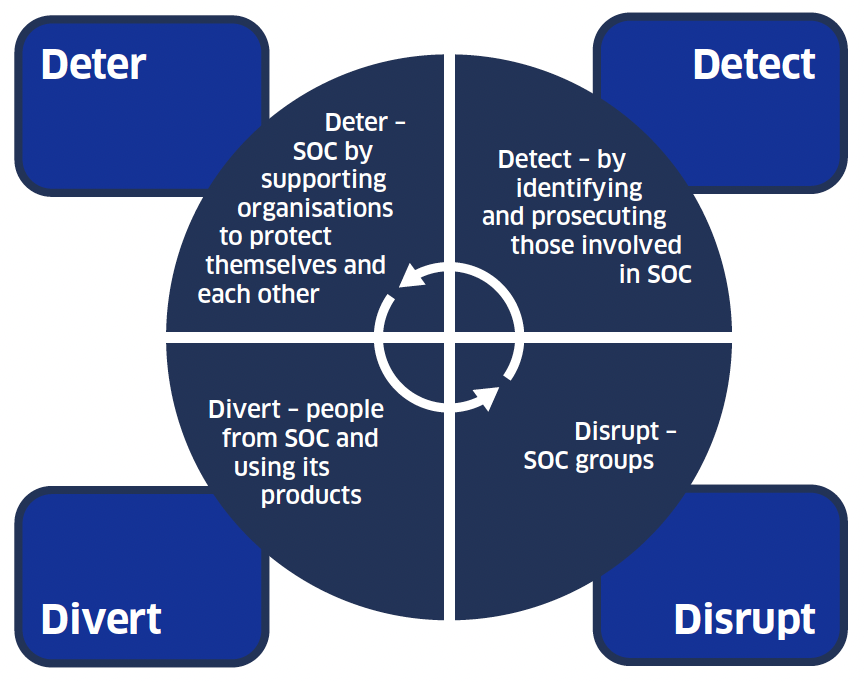
Divert
The Divert Strand aims to divert people from becoming involved in Serious Organised Crime and from using its products. The Strand Lead is Paul Carberry, Chief Executive of Action for Children.
Drugs Education Showcase
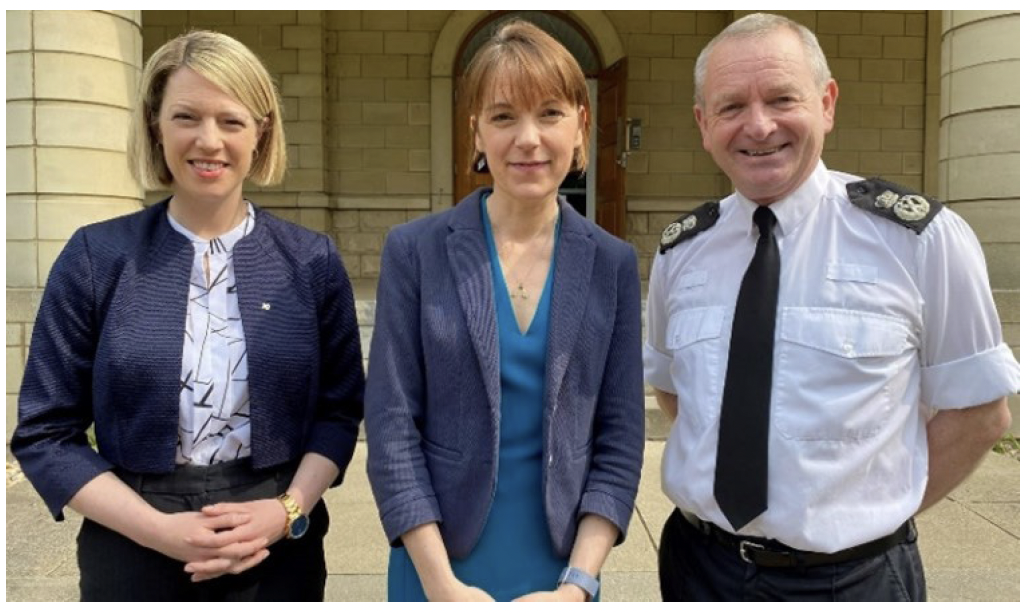
In May 2023, policy makers from across a number of sectors in Scotland attended an event to highlight the vital role education plays in protecting young people and preventing drug-related harm.
Held at Police Scotland’s headquarters and delivered by the Daniel Spargo-Mabbs Foundation, the event was addressed by the then Police Scotland Chief Constable, Sir Iain Livingstone QPM and Jenny Gilruth MSP, Cabinet Secretary for Education and Skills.
During the event, attendees heard a wide range of keynote speeches and took part in a question and answer session on the vital role of education and prevention in tackling the harm drugs present to individuals, families and communities. The event also saw a film performance of Mark Wheeler’s powerful play ‘I Love You, Mum – I Promise I Won’t Die’.
Drugs Education Pilot in Grampian Schools
The Daniel Spargo-Mabbs Foundation worked in partnership with Police Scotland to deliver a pilot project which aimed to divert young people away from getting involved with drugs and reduce the significant harm caused.
The pilot commenced in September 2023 in nine high schools in the Grampian region – three schools in each of the three authorities of Aberdeen City, Aberdeenshire and Moray. Schools were chosen in priority areas to ensure the project made a positive difference to young people, their parents, carers and the wider communities. The pilot was awarded £10,000 from the SOCT’s Community Grant Scheme.
The pilot included training for teachers and school staff, interactive workshops for students, online webinars for parents and carers, lesson plans and resources for teachers to deliver drug education lessons, ‘mission transition’ digital resources for P7 pupils, development of a Youth Ambassadors’ programme, and Theatre in Education performances of the play, ‘I Love You, Mum – I Promise I Won’t Die’.
The pilot is being monitored and evaluated by Aberdeen University and an interim evaluation report, which can be found here, was published in July 2024. Surveys of students and teachers, and close work with local stakeholders, should enable the DSM Foundation and Police Scotland to adapt existing programmes and develop new bespoke resources, to ensure the needs of young people are met, and local priorities, such as County Lines, included.
Criminal Exploitation Guidance for Practitioners
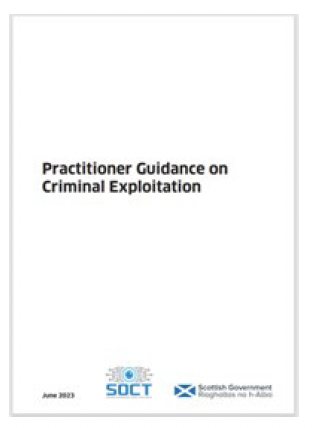
On behalf of the SOCT, in June 2023, the Scottish Government published guidance for practitioners on the criminal exploitation of children and vulnerable adults. The guidance aims to maximise Scotland’s coordinated and joined up response to all exploited individuals, making it easier for practitioners across Scotland to support children and vulnerable adults who have been victims of exploitation. The guidance document is available on the Scottish Government website.
A criminal exploitation awareness raising event was held in June 2024 to publicise the guidance, raise awareness of criminal exploitation and promote multi-agency working between and across organisations to ensure better outcomes for people on the cusp of serious organised crime.
Evaluation of the Action for Children SOC Early Intervention Service (SOCEIS)
In June 2023, Cardiff University completed their evaluation of the SOCEIS in Dundee, Edinburgh, Newcastle and Cardiff. The evaluation examined the feasibility and applicability of SOCEIS on diverting young people away from SOC. A programme theory approach was used to examine the delivery model using process evaluation, qualitative and quantitative research methods.
The SOCEIS engaged with 248 young people between July 2020 and January 2023. Most young people were white males with an average age of 15 years. This supports findings from the Glasgow evaluation in 2021 where most young people were male, aged between 14 and 16 at the time of referral.
The evaluation of the SOCEIS found that there is no one-size-fits-all intervention. The SOCEIS supported young people on their own terms and, as such, duration of engagement and intervention delivery varied substantially according to each young person.
Engagement and relationship-building were found to be key strengths of SOCEIS. This was facilitated by Action for Children’s positive reputation in the four areas and their proactive recruitment of experienced youth workers and the inclusion of peer mentors with relevant lived experience. It was noted that having highly skilled facilitators has been found to improve the effectiveness of interventions aimed at preventing crime and SOC involvement among young people.
The evaluation suggested six key recommendations for Action for Children to consider to further strengthen the delivery of SOCEIS e.g. Information sharing across partner organisations and individuals should be strengthened.
CashBack for Communities
CashBack for Communities is a Scottish Government programme which uses money seized under the Proceeds of Crime Act to provide opportunities for young people across Scotland. Since 2008, £130 million has been committed to community initiatives to improve the quality of life of young people across Scotland. Over 2.5 million activities and opportunities for young people have been delivered so far.
In December 2023, the evaluation report into phase five of the programme was published. The report found that both participation and outcome targets were exceeded, reaching more than 72,000 young people. This was 11,500 more young people than expected. This was due to flexibility, collaborative working and community connection.
The report also found that nearly 30,500 young people felt less inclined to get involved in anti-social behaviour. One young person said, ‘I think I have the ability to say no to anything that will put myself at risk or anything that will get me into trouble as before I would have gone along with whatever was happening.’
Scottish Sports Futures
Scottish Sports Futures (SSF) delivers three strands of CashBack-funded sports- focused youth work across 13 local authority areas of central Scotland.
- SSF Chance:2:Be is a personal development programme that uses the power of sport, youth work and relational approaches to support young people to reach their full potential.
- SSF Young Leaders empowers young people to take on leadership roles and become positive role models in their communities.
- SSF Twilight is a multi-sport programme that uses the power of sport and youth work to create safe and inclusive environments for young people to be active, engage in youth workshops, explore mental health and connect with local peers.
In addition, SSF Education & Training, funded by CashBack, is available throughout Scotland, providing education and accreditation programmes for young people, and training for practitioners working in a sport and youth work setting.
In 2023-24, of the 388 young people who engaged in SSF youth work provision, 172 reported their participation in antisocial or criminal behaviour had reduced due to participation in the project activities.
Police Scotland CashBack Violent Offenders Watch (VOW) Project
The CashBack VOW Project aims to reduce offending amongst young people between the ages of 10-25 in Edinburgh through combined interventions of police officers assigned to the programme working alongside peer mentors.
This approach has been successful in overcoming barriers and allows the team to develop a tailored and unique plan for the young person, based on their own views, goals and desires.
Key to the success of the programme are collaborative partnerships which signposts participants to services which cater for physical and mental health, housing and addiction services as well as offering training and education to improve opportunities for employability.
In 2023-24, the VOW Project supported 25 young people on a one-to-one basis, of whom all 25 reported their own participation in antisocial and/or criminal behaviour had reduced due to their participation in the project.
A further 1,554 young people across Edinburgh secondary schools were also engaged with the VOW Project, through the programme’s Turn Your Life Around outreach strand.
Fearless drugs campaign

In March 2024, Christina McKelvie MSP, Minister for Drugs and Alcohol, attended the launch of the Fearless drugs campaign at Craigroyston Community High School in Edinburgh.
The campaign was targeted at young people aged 13-18 with a secondary audience of adults who look after and work with young people. A video podcast was developed with Peer Mentors from The VOW Project and the Positive Outcomes Project who all had lived experience of addiction and criminal justice. Reflecting on their own personal stories of recovery, the Mentors spoke of their own journeys and how they now help others through substance misuse and the criminal justice system.
Deter
The Deter Strand aims to deter Serious Organised Crime Groups by supporting private, public and third sector organisations to protect themselves and each other. The Strand Lead for Deter is Amanda Hatton, Executive Director for Children, Education and Justice Services at City of Edinburgh Council and SOLACE representative on the SOCT.
Santa Marta Human Trafficking Summit
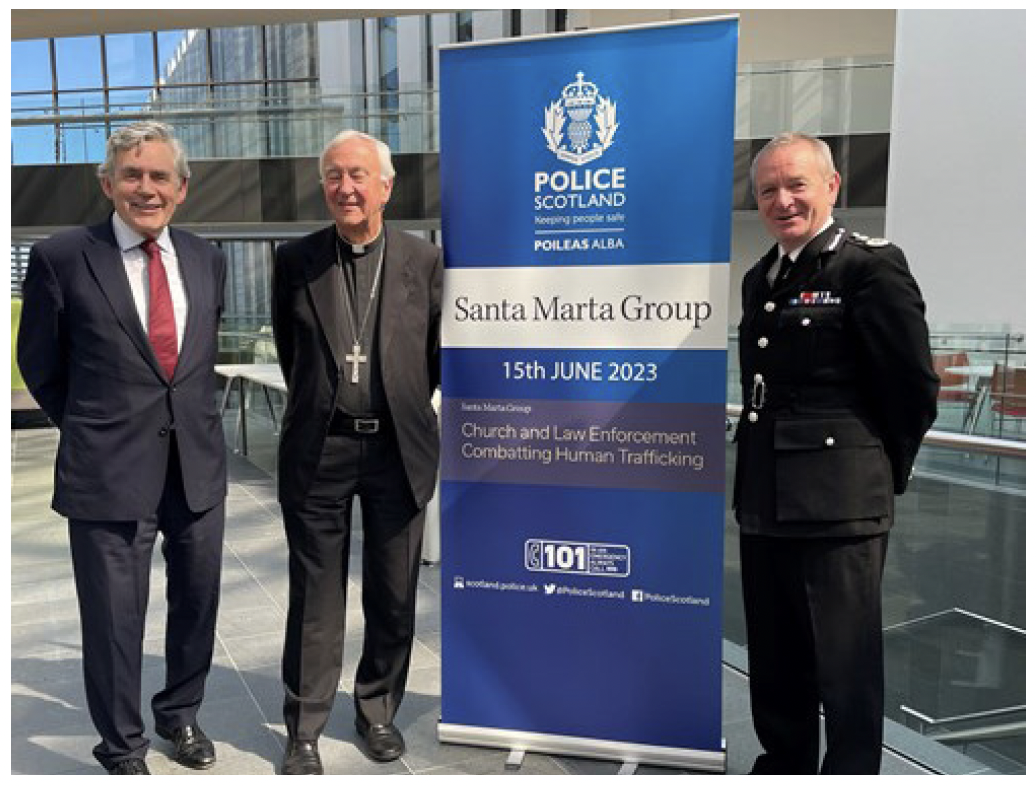
Human Trafficking and Exploitation (HT&E) occurs daily and is often hidden in plain sight. It requires a joined-up approach from Government, law enforcement, statutory bodies and civic society.
The then Chief Constable of Police Scotland, Sir Iain Livingstone QPM, in partnership with the Catholic Church Anti- Trafficking Santa Marta Group, held a summit on Thursday 15 June 2023 at the Scottish Crime Campus, Gartcosh.
The conference brought together the Cabinet Secretary for Justice and Home Affairs, the Solicitor General, Scottish Government representatives, National Police Co-ordination Centre Lead, Commissioner of An Garda Siocha along with several Chief Constables, faith leaders, third sector partners and two former Prime Ministers, in a bid to raise awareness of the harms caused by HT&E. A number of presentations were delivered, with breakout sessions held to consider opportunities for working together to eradicate HT&E.
Publication of the Scottish Government’s first Slavery and Human Trafficking Statement
HT&E has been identified in all areas of Scotland and takes place in every region across the world. In 2023, the Scottish Government published its first Slavery and Human Trafficking Statement in order to set out clearly the strategies and actions taken to identify, prevent and mitigate slavery and human trafficking in the Scottish Government’s own operations and supply chains.
The Scottish Government is clear that any contractual partners should adopt high standards of business ethics and this includes taking a robust approach to preventing human trafficking and exploitation in any part of their business and supply chain.
The Scottish Government continues to promote a positive approach to ethical procurement and mitigate the potential risks of HT&E in their contracts through the use of procurement legislation, policy and robust contract terms and conditions.
All invitations to tender issued by the Scottish Government include a provision to ensure that supply chains are free from HT&E, permitting the termination of contracts with suppliers for breaches of social, environmental or employment law, established by national law, international law, or collective agreements. These terms and conditions form part of every contract and framework awarded by the Scottish Government.
Business Crime Prevention
In June 2023, a new short-term initiative aimed at improving engagement between Scottish businesses, Police Scotland and other partners was launched. The operation included officers visiting businesses for a series of engagement days.
This initiative offered businesses an opportunity to discuss emerging crime trends and identify areas of concern for companies, particularly those within the retail sector. Police Scotland and other partners then provided a range of crime prevention advice and useful information aimed at reducing criminality around these premises.
The Business Engagement Days provided vital support to businesses big and small, and the team received positive feedback from all visits.
Tackling an illegal waste vehicle site in North Lanarkshire
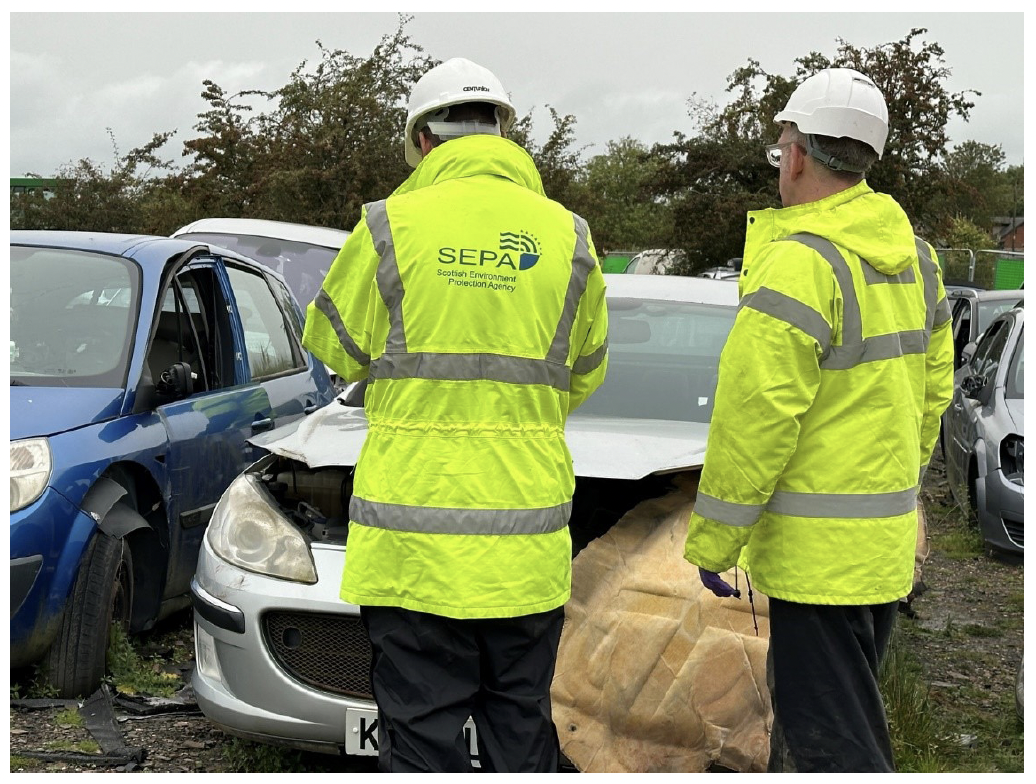
In September 2023, 16 officers from the Scottish Environmental Protection Agency (SEPA) were joined by officers from North Lanarkshire Council and Police Scotland to gather information on the range of businesses operating at the site, the size and scale of operations, the number of vehicles present and the risk of harm to the environment.
The site location had expanded significantly without the appropriate environmental and planning permissions, and concerns around waste criminality had been raised.
SEPA’s investigation is ongoing and as a result of their interventions to date, a number of waste vehicles on the site have been removed to an appropriately authorised waste management facility.
Scottish Resources Conference
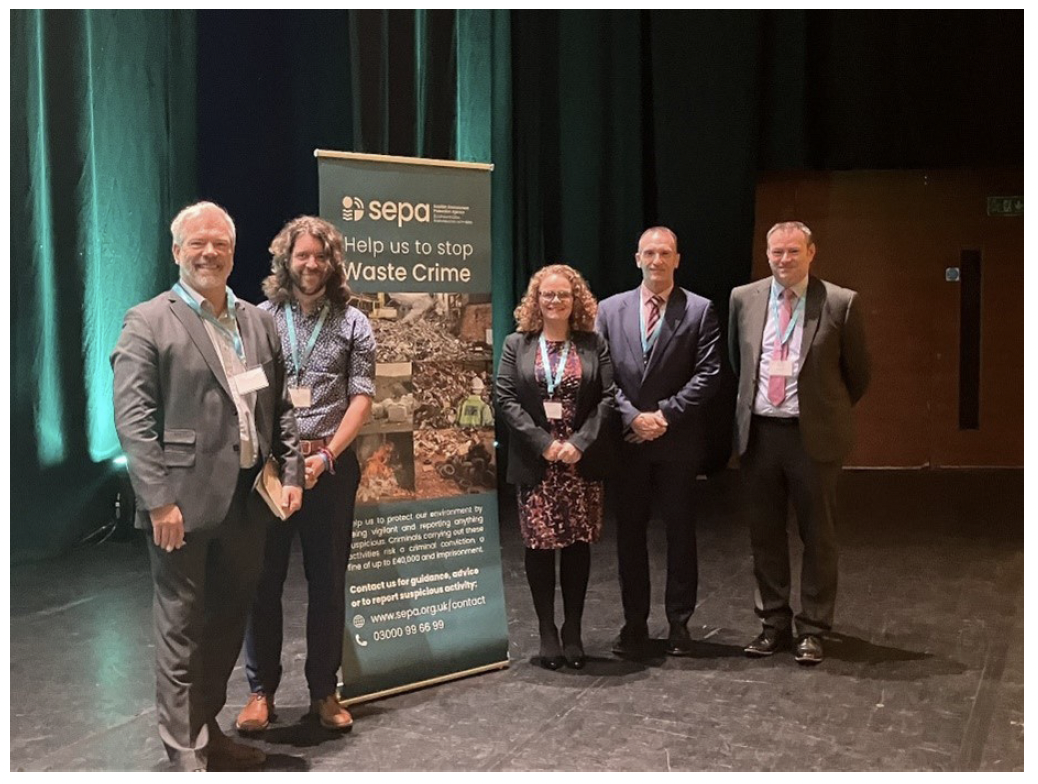
SEPA was invited to lead a session on ‘targeting waste crime’ at the Scottish Resources Conference in Perth in October 2023. SEPA’s Head of Enforcement, Jennifer Shearer, presented alongside partners from Revenue Scotland, North Lanarkshire Council and the Joint Unit for Waste Crime with input from Police Scotland.
The session focused on how working together to target high-risk environmental crime has brought a number of successes and highlighted how the industry and other public sector partners can contribute to this work. The importance of interventions and disruptions in targeting illegal activity were also highlighted as being necessary alongside traditional enforcement methods.
Scotland Excel: helping to deter SOC in public procurement
Scotland Excel continues to take steps to deter SOC involvement in public procurement when developing, evaluating and managing national contracts. Ensuring that the public sector procurement community is trained in identifying and preventing SOC involvement remains a priority for the organisation.
During 2023-24, Scotland Excel worked with Police Scotland to carry out a SOC Procurement Check on all recommended tenders for its £70 million security services and cash collection framework.
To support wider awareness of SOC, Scotland Excel delivered presentations on procurement fraud and collusion to the Scottish Local Authority Chief Internal Auditor Group and to the Scottish Local Authority Investigators Group. Links have been established with Renfrewshire Council’s counter fraud team to create reciprocal training opportunities.
In March 2024, the Scotland Excel Academy partnered with the Competition and Markets Authority to deliver a free webinar for more than 160 public sector professionals to help them recognise and respond to criminal behaviour in procurement. Subjects covered included SOC, bid-rigging, anti-competitive practices and cartel fraud. Delegates were given information on ways to prevent infiltration via the procurement and contract management cycles.
Detect
The Detect Strand aims to identify, detect and prosecute those involved in Serious Organised Crime. The Strand Lead for Detect is Deputy Chief Constable Bex Smith, Police Scotland’s lead for Crime and Operational support.
Partnership Activity on Environmental Crime
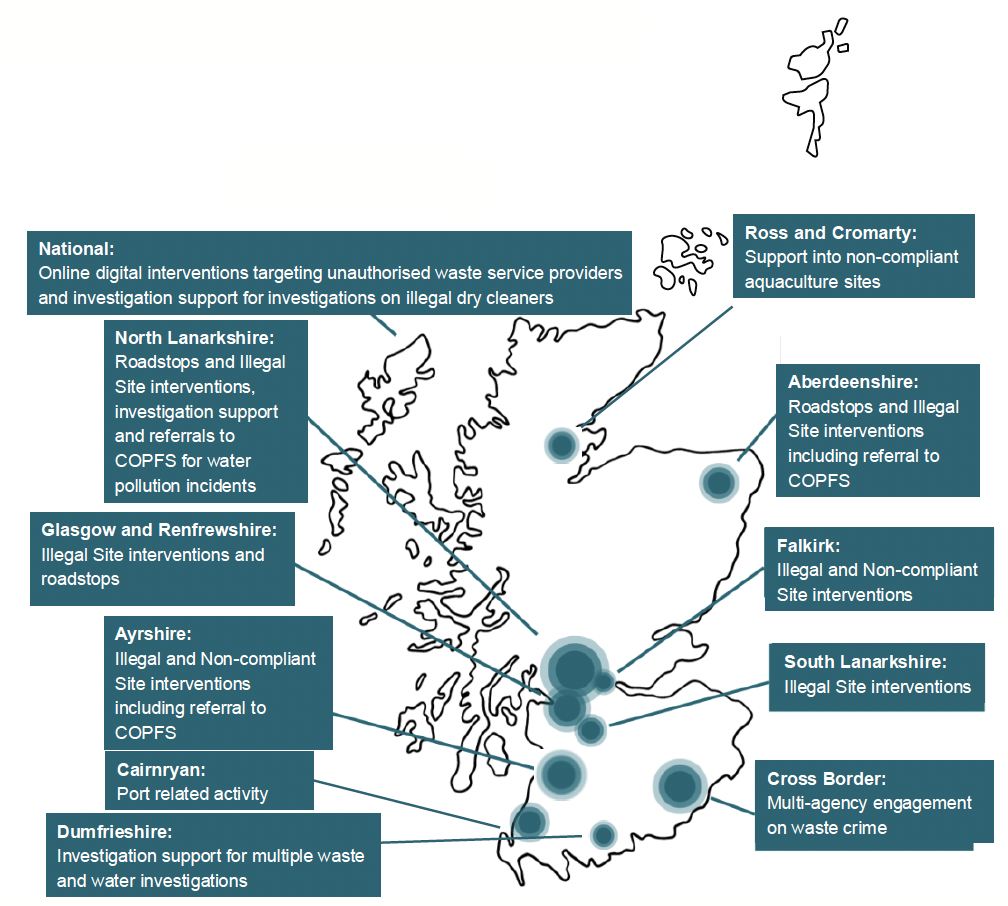
Note: The activity marker sizes are indicative of the number of activities involved
This map includes details of targeted activity in areas across Scotland. Across Scotland there has been online digital interventions targeting unauthorised waste service providers, investigation support for investigations on illegal dry cleaners.
In Ross and Cromarty, there has been investigation support into non-compliant aquaculture sites.
In Aberdeenshire, there has been road stops and illegal site interventions including referrals and Crown Office and Procurator Fiscal Service.
In Falkirk, there has been illegal and non-compliant site interventions.
In South Lanarkshire, there has been illegal site interventions.
There has been multi-agency engagement on waste crime across the border.
In Dumfriesshire, there has been investigation support for multiple waste and water investigations.
In Cairn Ryan, there has been port related activity.
In Ayrshire, there has been illegal and non-compliant site interventions including referrals to Crown Office and procurator Fiscal Service.
In Glasgow and Renfrewshire, there has been illegal site interventions and road stops of cars.
In North Lanarkshire, there has been road stops and illegal site interventions, investigation support with partners and referrals to Crown Office and Procurator Fiscal Service for water pollution incidents.
SEPA continues to make use of vital partnerships, particularly on cross-border illegality, to carry out operational activity and share intelligence on emerging threats and trends to allow for the effective deployment of resources to tackle and disrupt activities.
Organised Crime Partnership (OCP)
OCP Scotland is a collaborative unit of officers from the National Crime Agency and Police Scotland working together to tackle those involved in the highest levels of criminality, both in Scotland and abroad.
Successes include:
- investigation into a senior member of a SOCG who was running two cannabis farms in Scotland valued at £300,000. He was sentenced to eight years in prison in February 2024.
- in February 2024, a national investigation with Police Scotland, Border Force and others into large scale fraud targeting elderly and vulnerable victims saw seven people arrested and approximately £300,000 seized. The operation saw a significant increase of cannabis being smuggled in through Scottish airports, resulting in 17 arrests and approximately half a tonne of herbal cannabis seized.
County Lines – intensification weeks
During the national County Lines intensification weeks in October 2023 and March 2024, Police Scotland took action to protect vulnerable people and target the drugs dealers who exploit them. Throughout both weeks, officers in Scotland safeguarded 39 vulnerable people and engaged with another 1,720. 41 people were arrested for a variety of offences including being in possession of a firearm and ammunition, attempted murder and the supply of illegal drugs. Officers executed 33 drug and evidential search warrants.
Seizures included:
- over £305,000 worth of cocaine and crack cocaine;
- £68,000 worth of heroin;
- £224,200 in cash;
- cannabis and quantity of tablets;
- a taser, an imitation pistol, nine knives, machetes, meat cleaver, electric bike, two Audi cars and several mobile phones.
A joint Police Scotland and Dorset Constabulary day of action aimed at human trafficking took place during the week in March, with warrants at addresses in Aberdeen, Bournemouth and Poole being executed. Officers from Dorset travelled to Aberdeen and, with the assistance of Police Scotland officers, arrested a 21-year-old man from Bournemouth for human trafficking offences.
SOC Operations
Operation Hutch
An intelligence led investigation into the Human Trafficking and Sexual Exploitation of Romanian women in Scotland. The victims were young, vulnerable women who were being sexually exploited by a SOCG from Romania, who were operating at various locations across the Central Belt of Scotland with a base in Glasgow.
Police Scotland’s National Human Trafficking Unit led a multi-agency operation with the National Crime Agency, Europol and the Romanian Law Enforcement Community in order to investigate and combat the threat.
Enforcement action was carried out at two locations in Glasgow. Two accused were arrested and are currently on remand for Human Trafficking charges. A prosecution report was submitted to the COPFS for six additional accused.
Operation Skipper
An intelligence led investigation by the SOC Financial Investigation Unit (SOCFIU) into the money laundering activities of a SOCG orchestrating the movement of funds throughout the UK.
The investigation evolved from Operation Venetic where the principal was identified as the centre of a large-scale network offering money laundering services to Scottish- based SOCGs concerned in the sale and supply of drugs.
The SOCG serviced a number of criminal organisations and took on the role of either the controller or a highly trusted collector acting as an agent between the UK and a controller based overseas. The principal of the SOCG took possession of the criminally obtained money within the UK and made arrangements for the funds to be transferred overseas via bank transfers and crypto currency trading platforms.
SOCFIU commenced a designated money laundering investigation. Seven nominals were arrested and charged with offences under the Proceeds of Crime Act 2002 (POCA) with a further charge of directing SOC against the principal.
One of the members who laundered nearly £85,000 was charged with POCA offences and received an 18-month custodial sentence in May 2023.
A further individual appeared at Stirling Sheriff Court on 14 September 2023 and was found guilty of a POCA offence with the charge amended to include aggravation by connection with SOC in terms of Section 29 of the Criminal Justice Licensing (Scotland) Act 2010. The nominal was sentenced to a Community Payback Order and ordered to do 200 hours’ unpaid work within six months.
Operation Escalade
An investigation aimed at disrupting the activities of one of Scotland’s most prolific SOC groups which remains ongoing. Since its inception in 2014, a number of individuals have been convicted of serious offences including being involved in SOC, the supply and possession of drugs, firearm offences and money laundering.
Paul Fleming, known as ‘The Captain’, admitted running a major cocaine importation and distribution network using a fake solar panels company. Fleming was convicted of directing various people involved in SOC to commit a number of serious offences and was sentenced to nine years in August 2023. Fleming also recieved a four-year Serious Crime Prevention Order (SCPO) which will come into effect upon his release from prison.
SOC proceedings and convictions
One of the ways in which SOC offences can be prosecuted is using sections 28 to 31 of the Criminal Justice and Licensing (Scotland) Act 2010. This legislation provides offences of:
- s.28 – involvement in SOC;
- s.29 – offences aggravated by connection with SOC;
- s.30 – directing SOC; and
- s.31 – failure to report SOC.
| Main Charge | 2019-20 | 2020-21 | 2021-22 |
|---|---|---|---|
| Total Proceeded Against | 13 | 1 | 11 |
| S28(1) | 9 | 0 | 11 |
| S30(1)(A) | 0 | 1 | 0 |
| S30(1)(B) | 3 | 0 | 0 |
| S30(1)(B) & 30(2) | 1 | 0 | 0 |
| S31(1)(A) & B(I) | 0 | 0 | 0 |
| Total Convicted | 12 | 1 | 7 |
| S28(1) | 9 | 0 | 7 |
| S30(1)(A) | 0 | 1 | 0 |
| S30(1)(B) | 3 | 0 | 0 |
| S31(1)(A) & B(I) | 0 | 0 | 0 |
| Conviction Rate | 92% | 100% | 64% |
The data for 2022-23 is due to be published in December 2024.
| Charges and convictions with SOC aggravation | 2020-21 | 2021-22 | 2022-23 | 2023-24 | 2020-21 to 2022-23 |
|---|---|---|---|---|---|
| Charges prosecuted | 706 | 634 | 504 | 563 | 2,407 |
| Total convicted | 181 | 36 | 13 | 31 | 261 |
| % of charges convicted at date of extract | 26% | 6% | 3% | 4% | 11% |
Table 2 shows the position as of 10 September 2024. The COPFS has a live operational database and as more charges are progressed through the system, data will continue to be updated and is therefore subject to change.
Disrupt
The Disrupt Strand is responsible for disrupting Serious Organised Crime Groups. The Strand Lead for Disrupt is Kenny Donnelly, the Crown Office and Procurator Fiscal Service’s Deputy Crown Agent for Serious Casework.
Notable prosecutions
In August 2023, James White was sentenced to nine years and ten months in prison after being extradited from Brazil in 2022 for SOC and firearms offences. White was a senior member of a SOCG for nearly ten years and took over following the disappearance of James and Barry Gillespie. White’s conviction came through Operation Escalade, Police Scotland’s investigation into one of the country’s most prolific SOCGs.
The SOCG ran a criminal operation on an international scale in countries including Italy, the Netherlands, the United Arab Emirates, Russia and Brazil. White will be subject to a SCPO for four years upon his release from prison.
In September 2023, an individual with links to SOC who operated a multi- million pound smuggling operation to traffic Class A drugs from South America to Scotland was jailed for three years and nine months. The accused relied on trusted couriers to import raw cocaine and heroin from Ecuador, and then used secret laboratories to refine the drugs along with a number of associates before supplying and selling them to dealers throughout Scotland. The accused was sentenced at the High Court in Aberdeen after pleading guilty to a charge of being concerned in SOC between March and June 2020 at locations in Glasgow, Uddingston and Cumbernauld.
In March 2024, a man who used the homes of family members to conceal thousands of pounds made from drug deals was imprisoned for six years. The accused attempted to conceal his criminality by depositing money into a child’s bank account which, at one stage, contained funds totalling £353,000. He was sentenced at the High Court in Edinburgh after admitting being concerned in the supply of controlled drugs and pleading guilty to the culpable and reckless discharge of a firearm. The accused also received a three-year SCPO which comes into force on his release from prison.
In March 2024, an individual was jailed for eight years for running a drugs operation in Dundee. The accused was the first person in Scotland to be convicted following a trial as part of Operation Venetic, which stems from the retrieval by French agencies of data on the EncroChat communication network used by SOCGs. Confiscation proceedings have been initiated under POCA legislation.
Interventions and disruptions by SEPA and Partners
While SEPA continues to use all available enforcement tools available, such as civil penalties, enforcement notices and prosecution reports, they have placed a concerted effort into targeting effective interventions and disruptions as early as possible once illegal activity is detected, in order to prevent further or future harm being caused. Examples across the past year are displayed below:
Disruptions and Interventions
- Targeted Police Stops
- Arrest - Arrest of illegal operator by Police Scotland as part of partnership working to tackle the illegal site
- Intelligence - Using intelligence to flag high risk Waste Management Licensing Exemptions
- Proceeds of Crime Act - Confiscation Order of £215,000 issued
- Planning - Disrupting simple planning applications of illegal operators
- Insurance Industry - Illegal Operator insurance policies removed, or prices raised significantly
- Trading Standards - Targeting unlicenssed operators advertising on social media
- Online Operators - Targeting online operators – ‘same day’ / ‘next day’ pick up
- Weighbridges - Referral made for non-registered weighbridges
- Breach of the Peace Reports
- Robust Regulation - Illegal Operator made to clear site and change practices
- Duty of Care - 100 doors chapped – homeowners / businesses are aware of DoC
- Licence Removal - Removal of Operator’s licence and Transport Manager Licence
Digital Interventions
SEPA’s Digital Interventions work through the Litter & Flytipping Strategy continues to detect and disrupt illegal operators advertising their waste collection businesses on social media. An early pilot in this area revealed that 50% of the profiles reviewed were illegal. The disruption aspect included removal of profiles, monetary penalties and enforcement notices served, direct public messaging to raise awareness and operators obtaining the correct licence for their operations.
A recent Twitter campaign to raise awareness of this work and warn the public about how to avoid falling foul of these potential illegal operators, received high engagement and interaction. The campaign can be found on X (previously known as twitter) here.
Illicit tobacco and nicotine vape haul seized
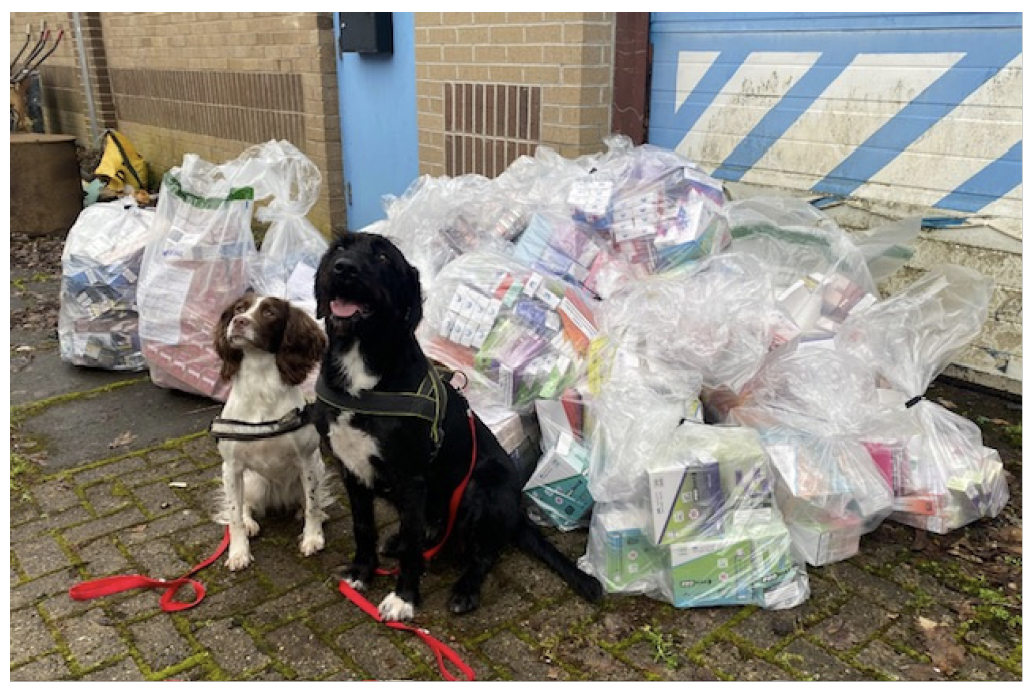
In March 2024, more than 46,000 illicit cigarettes and 1,600 non-compliant nicotine vapour products were seized by North Lanarkshire Council’s Trading Standards team from two premises in Wishaw.
With support from tobacco detection dogs Boo and Rosie, the team seized 46,300 cigarettes and 780g of hand-rolling tobacco which were concealed and stored in purpose-built areas, designed to evade detection.
The nicotine vapour products have tank sizes of between five and ten times the legal limits with a nicotine content equivalent to 400 cigarettes. Some of the supersized vapes had child-appealing packaging and included ‘Gummy Bear’, ‘Rainbow Candy’ and ‘Bubblegum Ice’ flavours.
Serious Crime Prevention Orders (SCPOs)
SCPOs are court orders which may be applied for by COPFS where a person has been convicted of, or is involved in, SOC. They were introduced in 2016 through the Serious Crime Act 2015.
The aim is to protect the public by restricting the activities of offenders once they are released from serving custodial sentences, to prevent them from becoming involved in SOC again. They are a valuable tool in disrupting SOC and are considered as a key part of the prosecution strategy in all significant SOC cases.
SCPOs can contain a range of restrictions, such as prohibiting the ownership of multiple mobile phones, or preventing someone from travelling abroad. A SCPO can last for a maximum of five years. The penalty for failing to comply with a SCPO is up to five years in prison and/or a fine.
As of March 2024, 113 individuals have had SCPOs imposed on them by Scottish courts. The majority of SCPOs granted in Scotland relate to individuals convicted of SOC.
| Year | 2020 | 2021 | 2022 | 2023 | 2024 (to Mar) |
|---|---|---|---|---|---|
| Annual SCPOs Granted | 13 | 7 | 18 | 18 | 8 |
| Cumulative Total | 13 | 20 | 38 | 56 | 64 |
80 individuals remain in prison with SCPOs granted but inactive until date of release. 33 nominals are ‘live’ with 32 being actively monitored in the community, one individual has since been recalled to prison.
SOCGs and Nominals
Police and partners in Scotland monitor the activity of known SOCGs and nominals identified as being involved in SOCGs. The data included below is Police Scotland’s Q4 management information and covers the period 1 December – 28 February of each of the respective years.
The number of known nominals has decreased by 29% since 2020-21, where there were 2,005, to 1,421 in 2023-24.
In 2023-24, 158 SOC nominals were incarcerated, the lowest figure of the relevant time series.
| Q4 Management information | 2020-21 | 2021-22 | 2022-23 | 2023-24 |
|---|---|---|---|---|
| SOC groups | 99 | 97 | 101 | 90 |
| SOC nominals | 2005 | 1827 | 1726 | 1421 |
| SOC nominals incarcerated | 166 | 196 | 165 | 158 |
| % SOC nominals incarcerated | 8% | 11% | 10% | 11% |
Proceeds of Crime
The Proceeds of Crime Act 2002 (POCA) is an extremely powerful and effective tool to disrupt SOC. It provides for the criminal confiscation or civil recovery of the financial benefit derived from criminal activity. A key element of the SOC Strategy to disrupt SOC is ensuring that criminals do not profit from their illegal activities and in 23-24, £10.4 million was remitted to the Scottish Consolidated Fund (SCF) through criminal confiscation and civil recovery under POCA. COPFS has a specialist team which works with a range of partners to ensure that the proceeds of crime are restrained and confiscated from offenders, following their conviction.
In 2023-24, 33 restraint orders were obtained, totalling approximately £5.6 million, and a further £15 million was secured by way of moratorium. 241 confiscation orders were obtained, totalling approximately £3.8 million.
Civil Recovery Unit (CRU)
The CRU operates on behalf of the Scottish Ministers. The CRU uses civil court proceedings to make Scotland a hostile environment for people involved in unlawful conduct, including SOC. To achieve this, the CRU conducts non-conviction-based asset recovery, investigating the source of funds used to acquire assets and recovering any property obtained through unlawful conduct. The CRU can also recover money which may be intended for use in unlawful conduct. By removing assets, including money, this disrupts the work of SOCGs. The sums recovered are remitted to the SCF and used by the CashBack for Communities programme.
The CRU works closely with law enforcement, government departments and agencies, and the financial sector. To maximise disruption, the CRU routinely refers cases to HMRC for the possible taxation of criminal gains.
| Year to 31 March | Court of Session (Asset Recovery) (£) | Cash Forfeiture (£) | Listed Assets (£) | Bank Account Freezing Orders (AFOs) (£) | Yearly total – all business areas (£) |
|---|---|---|---|---|---|
| 2020-2021 | 2,275,962 | 2,141,445 | 129,387 | 972,912 | 5,519,707 |
| 2021-2022 | 2,243,247 | 2,235,104 | 47,634 | 464,267 | 4,990,253 |
| 2022-2023 | 4,296,396 | 2,738,459 | 51,049 | 1,793,447 | 8,879,351 |
| 2023-2024 | 2,196,738 | 2,534,249 | 63,633 | 554,133 | 5,348,753 |
Disrupting SOCGs
In 2023, the CRU concluded a civil recovery investigation in relation to property held by the spouse of an individual involved in SOC. The CRU negotiated an outcome where a capital sum was paid and a house transferred to the Scottish Ministers. The house is in the process of being sold and the proceeds will be remitted to the SCF. The objective of disruption is also delivered by ensuring that the house is returned to the community free from connections to SOC.
Collaborating with Police Scotland and HMRC
Police Scotland referred nine Account Freezing Order (AFO) cases to CRU in relation to an ongoing investigation in partnership with the Portuguese authorities into an organised criminal network. Portuguese nationals were being recruited by SOCGs in Portugal to travel to Scotland, where they established fictitious companies and thereafter opened bank accounts to receive and launder the proceeds. Forfeiture was ordered in five of the cases resulting in a recovery of £283,000 and in the other three cases, the CRU was able to identify the victims and assisted in arranging for the banks to return £55,000 to them. The outcomes achieved in these cases highlights the success of collaborative working.
In 2024, the CRU concluded one of its larger civil recovery investigations with the sum of £1.9 million being paid into the SCF. Following initial work by HMRC, the case was referred to the CRU who established, during the course of its investigation, that two individuals had fraudulently obtained Bounce-Back Loans during the COVID-19 pandemic (approximately £100,000). A proportion of the fraudulent loan funds were then used to deal in crypto assets generating significant returns to the individuals. Working with HMRC, the CRU secured this successful outcome by recovering the fraudulent loan funds and profits generated by the individuals.
A successful outcome is not solely determined by the value of the assets recovered but also by the disruption to criminals, including those involved in SOC. For example, the CRU has recovered properties with low equity which were previously believed to be owned or occupied by SOC nominals.
Contact
Email: OrganisedCrimeUnit@gov.scot
There is a problem
Thanks for your feedback